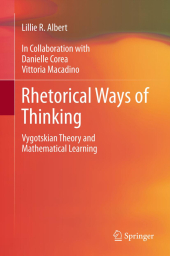 Neuerscheinungen 2014Stand: 2020-02-01 |
Schnellsuche
ISBN/Stichwort/Autor
|
Herderstraße 10
10625 Berlin
Tel.: 030 315 714 16
Fax 030 315 714 14
info@buchspektrum.de |

Lillie R. Albert, Danielle Corea, Vittoria Macadino
(Beteiligte)
Rhetorical Ways of Thinking
Vygotskian Theory and Mathematical Learning
Mitarbeit: Corea, Danielle; Macadino, Vittoria
2014. xii, 100 S. w. 21 b/w-fig. 235 mm
Verlag/Jahr: SPRINGER NETHERLANDS 2014
ISBN: 9400796501 (9400796501)
Neue ISBN: 978-9400796508 (9789400796508)
Preis und Lieferzeit: Bitte klicken
Combining Vygotskian theory with current teaching and learning practices, this volume focuses on how the co-construction of learning models the interpretation of a mathematical situation, providing educationalists with a valuable practical methodology.
Rhetorical Ways of Thinking focuses on how the co-construction of learning models the interpretation of a mathematical situation. It is a comprehensive examination of the role of sociocultural-historical theory developed by Vygotsky. This book puts forward the supposition that the major assumptions of sociocultural-historic theory are essential to understanding the theory´s application to mathematical pedagogy, which explores issues relevant to learning and teaching mathematics-in-context, thus providing a valuable practical tool for general mathematics education research. The most important goal, then, is to exemplify the merging of the theory with practice and the subsequent applications to mathematics teaching and learning. This monograph contains five chapters, including a primer to Vygotsky´s sociocultural historic theory, three comprehensive empirical studies examining: prospective teachers´ perception of mathematics teaching and learning and the practice of scaffolded instruction to assist practicing teachers in developing their understanding of pedagogical content knowledge. Finally, the book concludes with a contextualization of the theory, linking it to best practices in the classroom.__
Preface.- Chapter 1 Introduction.- Why Rhetorical Thinking.- Overview of Chapters.- Chapter 2 Vygotsky´s Sociocultural Historic Theory, A Primer.- INTRODUCTION.- TOOLS OF HUMAN INTENSIFICATION.- Mediation through Signs.- THE DEVELOPMENT OF HIGHER PSYCHOLOGICAL FUNCTIONS.- Distinguishing Between Lower and Higher Functioning.- THE ROLE OF THE ZONE OF PROXIMAL DEVELOPMENT.- The Complex Nature of the Zone of Proximal Development.- Learning Potential, Performance, and Context.- Intersubjective Learning.- CONCEPT DEVELOPMENT IN THINKING.- Spontaneous and Scientific Concepts.- THE RELATIONSHIP BETWEEN THINKING AND LANGUAGE.- CONCLUSION. Chapter 3 Images and Drawings: A Study of Prospective Teachers´ Perceptions of Teaching and Learning Mathematics.- INTRODUCTION.- AN EMERGING FRAMEWORK METHODOLOGY.- Coding Drawings.- Analysis of Focus Group Transcripts.- RESULTS.- The Changing Roles of Teachers.- Student Affect and Pedagogy.- Trends in Mathematical Representations and Content.- Changes in Room Structure.- DISCUSSION OF RESULTS.- CONCLUSION.- Chapter 4 Improving Teachers´ Mathematical Content Knowledge through Scaffolded Instruction.- INTRODUCTION.- THEORETICAL FRAMEWORK AND RELEVANT RESEARCH.- Explanation of the Framework.- METHODOLOGY.- Context and Participants.- Data Sources and Procedures.- Data Analysis.- FINDINGS.- Content Knowledge: Pretest and Posttest.- Presurvey and Postsurvey Results.- Talk and Scaffolded-Interactions.- Teacher-learner Talk and the More Knowledgeable Other.- DISCUSSION OF FINDINGS.- Connecting Learning to the Field of Social Interaction.- The Importance of Language and Action.- CONCLUDING COMMENTS.- Chapter 5 Closing Thoughts and Implications.- Teacher-generated Drawings as Tools of Human Development.- Achieving Intersubjectivity through Collaborative Learning.- Index.


